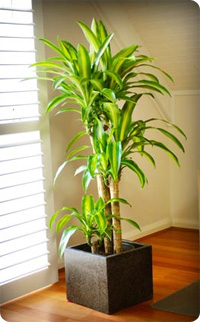Feng Shui Plants

Plants symbolize prosperity and are considered auspicious in Feng
Shui. Chinese linked the plants with the source of feelings and
hopes. However, everyone perceives plant differently and you can
exercise your own discretion in the selection of the plants. Infact,
the more pleased you are with the plants, the more positively they
will affect you. At the same time, you should be careful about the
location of the plants.
They should be kept in a place as per their respective requirements,
as Feng Shui cannot act as a substitute for good soil and sunlight.
In Feng Shui, plants are also classified depending on the energy
content and effect. They are associated with the five elements of
Feng Shui. Woody plants are considered good for modification and
movement. Fire plants, such as sunflower or daisy, symbolize beauty
and humor.
Earth plants, like Clematis, bring stability and peace. Metal
plants, such as Pampas Grass, signify strength and resilience.
Aquatic plants, such as Summer Aster, denote strong will and
seriousness. Thus, considering the varied properties of Plants, they
are used for different Feng Shui remedies and cures. There are many
reasons why plants are used both outside and inside the house. Some
of the main reasons are given below.
- Add Vitality (Living Chi)
- Encourage Luck
- Counteract Sha Chi
- Absorb Excessive Water Chi
Though nothing can match the vitality of living plants, you can put
an image or painting of the same in an area where it is difficult to
place a real one. Woody plants are very beneficial for the wealth
corner. Apart from this, different plants have different properties
and are used accordingly. Listed below are some of the plants, along
with their significance - according to which they are used in Feng
Shui.
| Acacia Tree: |
Permanence |
| Apricot: |
Fruitfulness |
| Aspidistra: |
Strength |
| Bamboo: |
Youth, Perseverance and good luck |
| Begonia: |
Perfect Yin/Yang Balance |
| Cherry: |
Fruitfulness |
| Camellia: |
Evergreen |
| Chrysanthemum: |
Endurance and long life |
| Cypress: |
Nobility |
| Delphinium: |
Consolidation |
| Flowers: |
Wealth |
| Gardenia: |
Strength |
| Hibiscus: |
Abundance |
| Hydrangea: |
Achievement |
| Jasmine: |
Friendship |
| Juniper: |
Tolerance |
| Lilies: |
Profusion |
| Lotus: |
Determination |
| Magnolia: |
Fragrance |
| Old Man: |
Longevity |
| Orange: |
Wealth |
| Orchid: |
Patience and endurance |
| Peach: |
Friendship |
| Pear: |
Long life |
| Peony: |
Wealth |
| Pine Tree: |
Long life |
| Plum: |
Beauty and youth |
| Pomegranate: |
Fertility Red |
| Happiness: |
Prosperity |
| Rhododendron: |
Fragility |
| Rose: |
Beauty |
| Water lily: |
Fortitude |
| Willow: |
Grace |
| Wisteria: |
Beauty |
| |
Other Categories
Feng Shui
Feng Shui Architecture
Feng Shui Home
Feng Shui Office
Feng Shui Products
Feng Shui Types
Feng Shui Colors
Feng Shui Cures
Feng Shui Decoration
Feng Shui Design
Feng Shui Elements
Feng Shui Garden
Feng Shui Gifts
Feng Shui Plants
Feng Shui Principles
Feng Shui Symbols
Feng Shui History
What is Feng Shui
Yin and Yang
|

